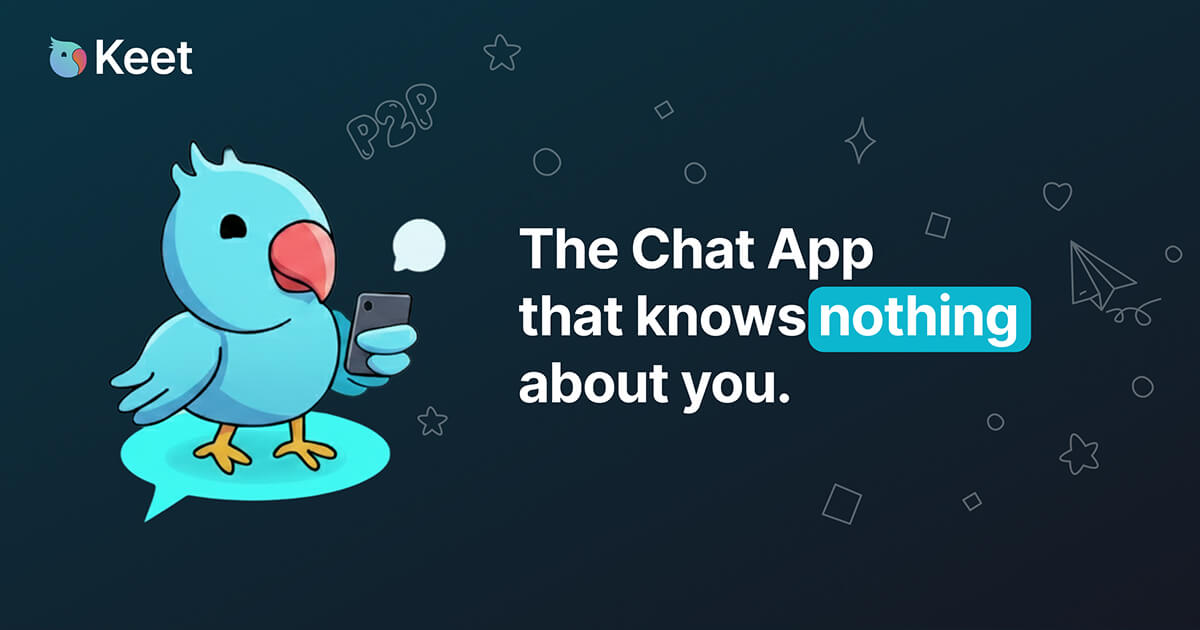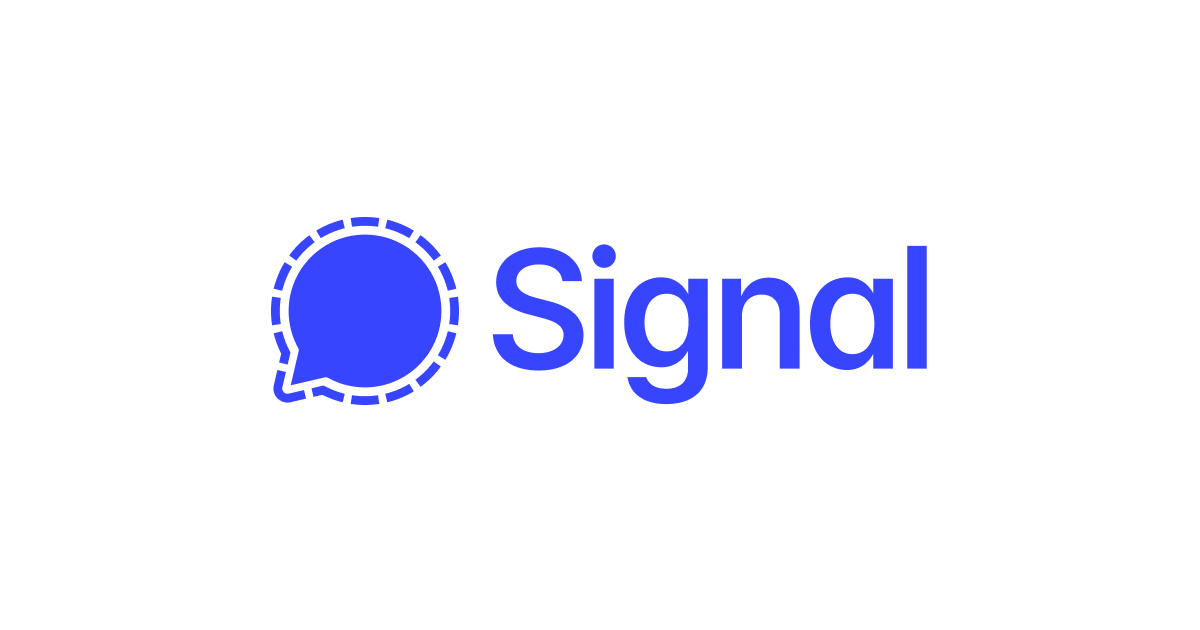@Mer__edith
https://keet.io/
https://docs.pears.com/
uses only edge devices as infra , does voice / video / txt / application distribution via hash urls, solved multi device identity in a p2p space , has search , no limits on file sharing , scales like bitorrent can do ip obfuscation via blind peers, has a whole ass software ecosystem that grows by the day.
it has bugs but it is amazing how well it works and i would say it's ready for scale up.
@Mer__edith it's a good app to use but uploading and sharing a video is a problem because the quality of the video is low.
@Mer__edith It is not about accessing someone's data but about relaying on such infrastructure. Those are two different things. We have already great example how can it be and what happens if you aren't fully independent from such services. This should be a very good lesson for the future, for you, your company and all the Sigjal users as well. It is right about time to start going decentralized way, don't you think?
@Mer__edith stop using excuses. You are paying American companies that do not respect privacy. There are several European alternatives that you can choose from, especially Germans.
@Mer__edith Thank you for taking the time to explain all this!
In a completely different direction -- are you actually on a server that limits you to 500 character posts? I mean, I am, but I'm not a communications expert.
@Mer__edith We may have to go back to paper and pencil!
My 2 cents:
Being on the Fediverse and also running an XMPP server, why do we use centralized systems?
Corporate takeover and control.
@Mer__edith Serious question: The concentration of providers for real-time, global networks, can it really be avoided? If we had ten of them instead of the , I don't know, the three? we have, they'd all have to have more or less the same kit, duplicating investments for a smaller share of the market. That would make it more expensive. Would that even work?
You can probably tell I'm not in this kind of business, but I'm a citizen of a European country, and de-coupling from US is dabated.
@Mer__edith upfront: i do highly value your work, both personally and that of the whole signal team. you are doing a great service to society!
also, i have not run signal's infrastructure, but i have run ISPs until 2008 and am still helping various clients deliver their serices. i will
not mention any names, but you know many of them. i might know a little bit about scalable software… 🧵
@Mer__edith for me, the AWS outage drew attention to Signal's centralized nature - that it runs on servers controlled by Signal and hosted in the US. Moving away from AWS would not address this problem. I have chosen to use decentralized messaging apps instead. They are just as secure, more resilient, and not dependent on Big Tech cloud infrastructure.
@Mer__edith It'd be really nice if I could run my own private signal server (or one server in a private cluster) so that an important part of my social network didn't *have* to depend on AWS.
@Mer__edith @Binder As I read through the thread my first thought was to convert these infrastructure systems into government-managed utilities. Of course, that would deter innovation and efficiency. Which leads me to development of utility regulations required for infrastructure systems allowing competition and profits, perhaps with some government investment equally spread across the competitive systems.
@Mer__edith Very insightful thread. Thank you for clearing this out. Unfortunately AWS is almost a necessity these days for scaling application
@Mer__edith Yeah and this is why when there's something with a use case similar to what #Signal is intended for, I always ask if it's #P2P.
@Mer__edith Thanks for the honest and thorough explanations! 🙏
While reading it, I was already afraid of the responses you would receive and they were partly confirmed.
Keep up the great work 👍
@Mer__edith how’s people comparing Signal to Mastodon? Or their own self-hosted service, software or whatever? How people cannot understand the privilege they have to know how and being able to run a self-hosted service?
@Mer__edith Thank you for the explanation. I support Signal.
This situation shows that more people should support EU companies whenever possible, rather than large corporations. We need alternatives for various services and must take small steps in this direction https://european-alternatives.eu/
@Mer__edith ,Wait, how does Threema work, for example?
@Mer__edith There are other options, others are doing it. Using AWS, GCP and Azure is a *choice*. You *can* technically build without them. It would also probably cost less. This is a political choice you are making.
@FreakyFwoof @Mer__edith I knew there was a reason I didn't ever use signal. lol
@Mer__edith Thank you for the thread. It’s honest and straightforward, making it a perfect example of “privacy is luxury” and not aligning with mass processing..
@Mer__edith
It is, to me, even more concerning how no one (none of our elected deciders anyway) seem to realise how powerful the #clubofoligarchs is. None of any nations matter at all when said club decides to (seriously) *use* that power.
Seem to be a different topic? Imho nope.
This AWS incident🤨 shows what *could* happen, showing just a glimpse of it.
looking at your replies to replies here that seem to make sense to me (especially re decentralization), you're telling them they don't know what they are talking about. well I definitely don't.
like with debates re #ATproto and #ActivityPub, I have thoughts but I know that we really need to see the experts debate each other somehow. I don't think it happens enough. so I'd say the same re #signal and #matrix etc.
@Mer__edith interesting engagement levels across different sites.
@Mer__edith one question I had as an SRE, do you use the same kinds of services across all the three big cloud providers in a multi-cloud configuration, or do you use unique/distinct functionality from each?
@Mer__edith what is AWS?
@Mer__edith not so surprising, as it's very difficult to do anything at any scale online and avoid AWS entirely.
The surprise shouldn't be about Signal, it should be a rallying cry to build diverse infrastructure.
Concerning, bc it indicates that the extent of the concentration of power in the hands of a few hyperscalers is way less widely understood than I’d assumed. Which bodes poorly for our ability to craft reality-based strategies capable of contesting this concentration & solving the real problem. 2/
The question isn’t "why does Signal use AWS?" It’s to look at the infrastructural requirements of any global, real-time, mass comms platform and ask how it is that we got to a place where there’s no realistic alternative to AWS and the other hyperscalers. 3/
Running a low-latency platform for instant comms capable of carrying millions of concurrent audio/video calls requires a pre-built, planet-spanning network of compute, storage and edge presence that requires constant maintenance, significant electricity and persistent attention and monitoring. 4/
Instant messaging demands near-zero latency. Voice and video in particular require complex global signaling & regional relays to manage jitter and packet loss. These are things that AWS, Azure, and GCP provide at global scale that, practically speaking, others (in the western context) don’t. 5/
This isn't ‘'renting a server.' It's leasing access to a whole sprawling, capital-intensive, technically-capable system that must be just as available in Cairo as in Capetown, just as functional in Bangkok as Berlin. Particularly given the high stakes use cases of many who rely on Signal. 6/
Such infrastructure costs billions and billions of dollars to provision and maintain, and it’s highly depreciable. In the case of the hyperscalers, the staggering cost is cross-subsidized by other businesses–themselves also massive platforms with significant lockin. 7/
Meaning that infrastructure like AWS is not something that Signal, or almost anyone else, could afford to just “spin up.” Which is why nearly everyone that manages a real-time service–from Signal, to X, to Palantir, to Mastodon–rely at least in part on services provisioned by these companies. 8/
But even if Signal had the billions needed to recreate AWS, it’s not just about money. The talent to run these systems is rare & concentrated. The expertise, the tooling, the playbooks, the very language of modern SRE came out of these hyperscalers, and is now synonymous with 'the cloud.' 9/
o, yes, Signal runs on AWS. It also runs on your phone, which runs on iOS (Apple) or Android (Google). And on Dekstop, via Windows (Microsoft). Each of these presents similar dependencies on large entrenched tech companies, and concomitant barriers and risks. 10/
In short, the problem here is not that Signal ‘chose’ to run on AWS. The problem is the concentration of power in the infrastructure space that means there isn’t really another choice: the entire stack, practically speaking, is owned by 3-4 players. 11/
So, Signal does what we can to provide a service w integrity in the concentrated ecosystem we're working in. We protect your comms w end-to-end encryption, so that we can use AWS and others as a highway across which to send Signal data in ways that don’t let AWS, or anyone else, gain access. 12/
To conclude: my silver lining hope is that AWS going down can be a learning moment, in which the risks of concentrating the nervous system of our world in the hands of a few players become very clear. And that this can help us craft ways of undoing this concentration and creating real choice ❤️ 13/
@Mer__edith Maybe we should focus more on cloud interop, to reduce migration costs and enable better market dynamics? Too bad, EU is mostly just wasting money with their sovereignty initiatives…
@Mer__edith Hello Meredith, all fair points of course, and I believe that many understood what happened. Isn't there a way to distribute the load in a fashion that it would not fail when US-EAST-1 at AWS is down ? (either with AWS itself or with other providers to balance the risks)
@Mer__edith Thank you for sharing your perspective. It is very clear and understandable. Are there any project/research started/ongoing at Signal or elsewhere that Signal contributes to in order to tackle that elephant in the room?
@Mer__edith Maybe i'm too naive, but "And that this can help us craft ways of undoing this" sounds to me like, we will see a press-release from Signal - soon -
"We stopped using AWS, because we cannot run reliable services on top of them" ...
@Mer__edith The even worst part imo is that usually when a smaller player comes into play and they have LOTS of brains and rare talent and passion and love for what their doing, will either get lost because people's everyday life is soooo dependent on these evil corps. OR these corps. will buy them out... BUT that means that more effort needs to be put in decentralization, as way of life of sorts. As a stand. Of stop using one thing for everything and instead try to have more things that do ONE thing and do it well. Decentralization = more control from the person and less control from the big players. Centralization is the exact opposite... But it's easy... :/
@Mer__edith yupppp!
@Mer__edith great explanation and thank you for that.
Is it possible to build a future promoting other competitors to AWS gathering partners (other executive leadership with different companies) who rely heavily on these services to help level the playing field as well as give applications like Signal multiple options to run their infra? It would be complex, but it already is anyway. I've learned over the years to be as redundant as possible in every aspect of your infrastructure which includes things like cloud providers.
I have ran redundant workloads in AWS, GCP, Azure and tried to tie that in with smaller orgs like Linode, OVH and have had success. I understand that Signal is far more complex and your service needs to be real time whereas in oil and gas(the industry I was in mainly during my career) not everything needed to be as real time as your application.
We need someone to kickstart us into balancing out the playing field to give other, smaller competitors a chance at the same time helping to make these applications more redundant in the event of a disaster like we just had. Costs for such a design would be high but overtime that could balance out as we get more competition flowing.
@Mer__edith The reason AWS is affordable is because they are *still* subsidizing your invoices by 80%. When doing price comparisons assume that one day AWS will start charging 5x more once they have succeeded in killing the rest of the competition. All of them will. Im certain if AWS was charging what it costs to run that service that colo or any other option would be just as viable from a price perspective. They absolutely cannot compete on anything other than price. They are really bad at it
@Mer__edith Is there any chance of Signal adding its own keyboard in the future? The input system seems like a pretty important privacy concern at the moment.
@Mer__edith I'm sure millions of folks appreciate your service and the work you all do. but I think that 2025 Oct 20 outage revealed Signal has a de facto SPOF on AWS us-east-1. its an architectural flaw not unique to Signal, obvs, since it bit lots of other systems around the world. I do hope your team can devise a way to change your architecture to remove that SPOF
@Mer__edith Thanks, your explanation is helpful. Does it suggest that text-messaging should perhaps be the focus? I'm amazed that video/audio is possible, but it incurs much more massive requirements - it seems that the video/audio service is constraining the possible infra choices for the text-message service.
@danstowell No, because no modern and useful comms platform provides only text messaging. And if your platform doesn't provide normative features and functionality, people won't use it. And if they don't use it--even if you do--you can't use it either. The network effect rules communications effectiveness.
@Mer__edith True true!
@Mer__edith @danstowell thanks Meredith for all your work. People here do not understand that we need a privacy oriented service that people actually use, and not only by the privileged minority that can self host or are technically aware. And that requires compromises sometime, due to the political economical landscape, but appreciate Signal never compromise on encryption and privacy!
@Mer__edith @danstowell may i ask if audio/video via signal provides the same security guarantees as does the text messaging? last time i checked (years ago) i was disappointed by the gap i saw.
@Mer__edith
I remember SETI distributed a program that could, if installed on PC's, help them to run calculations to detect alien intelligence signs from radiotelescope observation files.
I wonder why there wouldn't be an option on signal desktop to allow PC's to be able to carry part of the traffic as a node (like Session messenger does).
This could help alleviate the effects of the next AWS outage, wouldn't it?
@Mer__edith ^^ great thread and right in your area @ufried of digital sovereignty… And what to actual focus on.
@Mer__edith What was surprising to me was that a problem in one AWS availability zone caused a persistent outage for my Signal connection that lasted at least 3 hours. I expected there would be some sort of automated failover to another zone or cloud provider happening in the background, limiting the downtime to, say, maximum 15 minutes. I hope your internal post-mortem is taking a look at how to be better prepared next time.
@Mer__edith
Yes, you're right. But it's also important to recognise that a single channel such as Signal is not sufficient for critical communication. However, that's not Signal's problem.
@Mer__edith I'm sure a thousand people told you this recently, but the way to avoid hyperscalers is to federate.
I still love Signal for having good crypto but creating a centralized service for something freedom is still a bad idea.
I wish the Signal folks and the Matrix folks would team up to create a really secure, easy to use and federated messenger.
@Mer__edith I guess my only issue with AWS is the owner being in bed with Comrade Krasnov which makes it quite easy to basically pull Signal offline
Akamai might well be able to provide a similar WW platform, but also they are US based.
But, less dependency of US politics would be appreciated, but for now I don't know a solution to that ..
@Mer__edith I understand what you're saying but I also wonder if maybe you've been sold a bill of goods. I run a real time communications company (admittedly very much smaller) and one of our core philosophies has always been data sovereignty. Of course as you rightly noted we can't build data centers but there's plenty of space for lease globally where you can scale you're own gear. We've made access to the physical layer a priority, maybe Signal can as well?
@Mer__edith It is not in the interests of a capitalist to give you a choice. It is in their interests to force you to use their service.
Does this mean you are coming out as an anticapitalist?
@Mer__edith thanks for the clarity of this thread! it's great this event uncovered the infrastructure we are depending on.
@Mer__edith but its also concerning that a failure somewhere in the US brings down Signal users in Switzerland, Turkey , Iceland, Sierra Leone and Nigeria. Yes hyperscalers are nice as they are everywhere but the dependency becomes brutal and expensive. Im running myself a backbone across multiple continents and redundancy is an absolute must. Signal has failed here. Blaming only AWS is the wrong path. Signal is big enough to do it better. Thats why I am a long term subscriber of it.
@Mer__edith
Thank you for clarification! I really appreciate your work, though it depends on those big corporations. There are always some tradeoffs we need to make.
@Mer__edith To clarify, are you multi-region within AWS? A bit hard to find info on this.
(A little concerning that so many people are worried about the privacy implications of Signal running on AWS... maybe some missing education on E2EE.)
@Mer__edith what I don’t understand is that after all these years nobody was able to make something (partly, mainly, or completely) distributed.
@Mer__edith RIP your mentions, seriously.
It might help to share Moxie Marlinspike’s explanation (from 10 years ago) of why he did not build Signal as a federated or decentralized service. It was a very conscious choice and the wide adoption of Signal since then validates him.
@Mer__edith Seems to me that the crucial thing is gradual degradation rather than all or nothing.
So the base line is basic messaging running on the good ol' internet with no cloud providers; then actual instant messaging; then audio; then 1:1 video with jittering; then quality 1:1 video; then multiple video. This way if AWS (or whoever) fails, the service degrades, but is still usable in some form.
No idea if Signal already does this, but that was the whole point of the Internet wasn't it?
@Mer__edith What Delta Chat says about your claim:
'Signal's president claimed it takes billions to replicate the availability and reliability of "hyperscalers" (AWS/Google/Microsoft/Cloudfare) that Signal uses.
#chatmail and #deltachat are about disproving this claim by
1) making relays super cheap (DONE)
2) enabling chat profiles to use multiple relays redundantly (WIP)
3) distributing relay knowledge among chatters (TBD).
(...)'
https://chaos.social/@delta/115454041149791990
@Mer__edith I am not surprised. It just fits as Signal is also a centralized service. 🤷 I'll stay with federated services like #XMPP (or #Matrix or #DeltaChat) which works quite well although you imply otherwise...
@Mer__edith I get your points and can see your reasoning. The counter argument I would make (as I do for other tech, too, not just Signal) is that unless we actually spend our money with (currently) smaller providers in the space, they will never stand a chance to expand and offer viable alternatives. At least some part of our business decisions should pave the way towards a more resilient future. But that's just my opinion fwiw.
@Mer__edith exactly! Signal didn't have many, if any options.
It's a screaming canary in the tech-infra-coal-mine.
We have to build alternatives! Or we're all silenced, on a whim or a failure.
@Mer__edith Not only is there not "another choice", but the economics you so well describe *require* an oligopoly -- there's no other way to get the required concentration of capital.
(Well, a regulated monopoly might work. But it's unclear how to regulate a truly global monopoly. And I'm not sure I'd want the cloud equivalent of PG&E running my servers.)
@Mer__edith it’s even worse than that. 20 years ago most of the network pipes were owned and managed by telcos, nowadays it is the hyperscalers who commission international fiber cables and the bulk of Internet traffic goes over their backbones:
https://hknog.net/wp-content/uploads/2018/03/01_GeoffHuston_TheDeath_of_Transit_and_Beyond.pdf
The problem is that signal is not running as a federated service. This makes you dependend on services like AWS and the like.
And there's another AWS/(any evil hosting service): As I understood #signal hashes phone numbers before uploading them to let accounts discover each other. The number space of phone numbers is not really big and having computing power and storage space at hand it shouldn't be too complicated to make a database to quickly access any phone number by its hash.
This information - using default signal settings - is exposed to super computing companies. This information allows to recreate the topology of the social network that is made of the millions of signal accounts.
You might want to refresh your understanding about this, because that is not how signal has done it for years.
They have an article about "Private Contact Discovery" on their site.
@me @Mer__edith You did indeed not completely understand. https://signal.org/blog/private-contact-discovery/
I've been using #Signal from the very beginning (TextSecure times), and I've been advocating Signal a lot.
But the centralized architecture, instead of a federated decentralized approach is something I never liked. Also the focus on BigTech platforms (IOS, Android) is something I do not like. I'm using a #Librem5 #Linux phone, but there is no official primary client for Linux.
Still, I'm donating, but I would appreciate addressing centralism and #BigTech dependency.
@Mer__edith Surprised you had to even explain any of this until I saw the replies suggesting Tor and "why don't you run your own infra?" 🙄😮💨
@Mer__edith my phone runs without Google, but you [edit delete: force][edit insert: very strongly suggest to and actively hide other options from] me to download signal via Google by not permitting @fdroidorg to serve your APKs [edit insert: and not mentioning any other way on your own web space].
@Mer__edith Thanks for the threat
@Mer__edith Signal on desktop also runs on Linux, which sounds quite right from the first look, BUT Signal on desktop is just a remote control of the phone-installed Signal app!
So you are still bound to Apple and Google.
That's another bad decision. It relates to the bad decision of using the phone number as ID.
@Mer__edith and on #postmarketOS Linux smartphones ☺️
@Mer__edith I'm not an expert but always a bit sceptic of such "Use GAFAM or go to the woods live in your cave" approach. Both my laptop (Linux, not Microsoft) and my phone (Again Linux not Google nor Apple) let me chat/video call via @delta (not GAFAM afaik) or @Matrix (also not GAFAM afaik). Maybe they use AWS too (yet worked through the outage), maybe they don't "do it at scale" ... as far as they work for me I'm happy to use/support them. And if they don't for some reason I'd stick to email.
That's not a good comparison.
We can choose to run Signal on free software.
Signal offers to run on fascist software, and as you say it's a good trade-off; but it doesn't impose the use of such software.
@Mer__edith You're forgetting about, say, GrapheneOS or Linux there. I would guess that many of the users who are concerned about this don't rely on Big Tech OS....
@f true, but at least some of their interlocutors almost certainly 'rely on big tech' OS's, so they still need to care.
@Mer__edith I just hope they don't get rid of those people who are able to build and maintain the stuff to run the whole system by some 'ai'...
@Mer__edith Agree - if you want to run your service centralized. Neither my Mastodon nor my Matrix-server need anything but my own self-hosting. Of course they won't handle billions of concurrent customers - but a few tens of thousands similar to mine will. Together.
I simply don't think Signal being centralized is a good thing. It's your choice, but alternatives do exist and those do not need hyperscalers.
@troed I don't think you have a clear understanding of this space, but I hope you have a good time digging in and learning more.
@Mer__edith Thanks for your condescending reply. I used to manage global SaaS within fintech with nodes in GCP, AWS and Azure and on multiple different continents.
@Mer__edith 👎️
@Mer__edith It's possible to manage a real-time service without these companies, but it's challenging. I understand that it would hard for Signal to build and maintain its own infrastructure, but the questions is, if Signal team is considering what to do in the future to make impact of future outages (which may occur again) to have lesser impact on people who use it.
Mastodon? The comparison is flawed.
You can run Mastodon without AWS, etc. just fine.
You even can run an instance in your basement if you want.
@Mer__edith I'm curious, which parts of the decentralized systems such as Mastodon do have to run on big tech infrastructure? If there is one wouldn't there be a way to make them independent ?
I'm only aware of the lack of local hosters and infrastructure in some parts of the world. I tried to setup a self-hosted server in Western-Africa...
@Mer__edith AFAIK, the mastodon running in my basement has no reliance on AWS whatsoever. The dev might be though, no idea. But the OP, no.
@Mer__edith aren’t most mastodon instances hosted in Europe, mostly on Hetzner? I know it’s not as sensitive to latency as a real time communication tool such as signal, but there it is.
@Mer__edith amen, this is what I keep telling my clients as well: AWS gives you a standardized product that works reliably well at a small scale and at an insane scale.
I always give them the option to hire teams of ops people to maintain servers and infrastructure 24/7 too. But then the high capex is also quite off-putting.
Eventually for small companies (I usually deal with ~50 FTE companies providing a SaaS product), it just makes more sense to use AWS and focus on their core product instead.
@Mer__edith But you don't have to rent a server or such, if you manage to let the peers communicate directly with each others. There is still an extremely expensive and large amount of hardware behind it, it's called “the Internet”. But it's not owned by one rich Bezos guy.
Decentralized is clearly more difficult. But it means you don't depend on any special large service which can be forced by legal means to conform to whatever surveillance laws there are.
@Mer__edith does that mean that it could be made possible to fallback to a system where messages still get through, just not in real time?
@Mer__edith Just like almost everyone else, Signal is using a WebRTC-based stack for calls. This means:
- Signalling is forwarding SDPs generated by libwebrtc to other client(s). This is just a few messages at the begin of a call, doesn't need to be low latency and can just use the regular message infrastructure.
- Actual data transfer uses direct p2p connection if possible or TURN if not. The TURN server can operate completely independent of the messaging infrastructure.
@Mer__edith But if the choice is “having a low-latency messenger” or “having a mediocre-latency messenger, not being dependable upon Bezos”, I’d take the mediocre-latency messenger, tbh. I don’t need on-the-second arrival times of text messages.
Yes, I am only one guy, and the Signal userbase is huge. But what fits Signal’s mission and expectation of its users best? Being available when others are taken down, albeit taking a bit more time to send/get acknowledgement of read status? Being state-of-the-art-fast&lean?
This is not a yes/no/easy decision, I get it. But I still would prefer Signal not being hosted within the reach of a maniac, and its friend, another maniac. Not a matter of encryption, but both hold Signal’s power-off-buttons next to their thumbs.
The key word is "infrastructure". Infrastructure and (so called) free market don't go together well.
@Mer__edith What if, instead of running a global comms platform for millions of people that requires AWS level infrastructure, we run a bunch of small, local ones that all federate and interop with each other? 😍
@Mer__edith I mean, you could host a distributed network of servers hosted in multiple different countries indifferent regions, it's just that it's more difficult and expensive than, you know, paying Amazon to do that for you.
We're a lazy species in general 6o my great disappointment.
@Mer__edith That's only true for centralized models like Signal, which therefore depend on centrally-controlled infrastructures. My grandma was wiser: she told me not to put all the eggs in the same basket. Granted, she was not CEO of a billion $ company.


































































































📣THREAD: It’s surprising to me that so many people were surprised to learn that Signal runs partly on AWS (something we can do because we use encryption to make sure no one but you–not AWS, not Signal, not anyone–can access your comms).
It’s also concerning. 1/